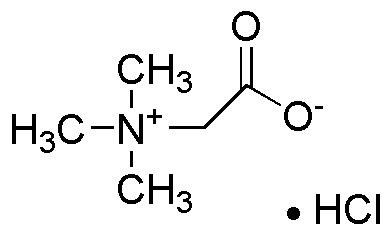Betaine hydrochloride is widely utilized in research focused on various applications:
- Animal Nutrition: Commonly used as a feed additive in livestock and poultry to enhance growth performance and improve feed efficiency.
- Human Dietary Supplements: Incorporated into supplements to support digestive health and improve athletic performance by reducing muscle fatigue.
- Cosmetic Formulations: Added to skincare products for its moisturizing properties, helping to maintain skin hydration and improve texture.
- Pharmaceuticals: Explored in drug formulations for its potential to aid in the treatment of certain metabolic disorders, offering a safer alternative to other compounds.
- Biotechnology: Utilized in cell culture media to promote cell growth and enhance the yield of biopharmaceuticals, making it essential in research and development.
General Information
Properties
Safety and Regulations
Applications
Betaine hydrochloride is widely utilized in research focused on various applications:
- Animal Nutrition: Commonly used as a feed additive in livestock and poultry to enhance growth performance and improve feed efficiency.
- Human Dietary Supplements: Incorporated into supplements to support digestive health and improve athletic performance by reducing muscle fatigue.
- Cosmetic Formulations: Added to skincare products for its moisturizing properties, helping to maintain skin hydration and improve texture.
- Pharmaceuticals: Explored in drug formulations for its potential to aid in the treatment of certain metabolic disorders, offering a safer alternative to other compounds.
- Biotechnology: Utilized in cell culture media to promote cell growth and enhance the yield of biopharmaceuticals, making it essential in research and development.
Documents
Safety Data Sheets (SDS)
The SDS provides comprehensive safety information on handling, storage, and disposal of the product.
Product Specification (PS)
The PS provides a comprehensive breakdown of the product’s properties, including chemical composition, physical state, purity, and storage requirements. It also details acceptable quality ranges and the product's intended applications.
Certificates of Analysis (COA)
Search for Certificates of Analysis (COA) by entering the products Lot Number. Lot and Batch Numbers can be found on a product’s label following the words ‘Lot’ or ‘Batch’.
*Catalog Number
*Lot Number
Certificates Of Origin (COO)
This COO confirms the country where the product was manufactured, and also details the materials and components used in it and whether it is derived from natural, synthetic, or other specific sources. This certificate may be required for customs, trade, and regulatory compliance.
*Catalog Number
*Lot Number
Safety Data Sheets (SDS)
The SDS provides comprehensive safety information on handling, storage, and disposal of the product.
DownloadProduct Specification (PS)
The PS provides a comprehensive breakdown of the product’s properties, including chemical composition, physical state, purity, and storage requirements. It also details acceptable quality ranges and the product's intended applications.
DownloadCertificates of Analysis (COA)
Search for Certificates of Analysis (COA) by entering the products Lot Number. Lot and Batch Numbers can be found on a product’s label following the words ‘Lot’ or ‘Batch’.
*Catalog Number
*Lot Number
Certificates Of Origin (COO)
This COO confirms the country where the product was manufactured, and also details the materials and components used in it and whether it is derived from natural, synthetic, or other specific sources. This certificate may be required for customs, trade, and regulatory compliance.


